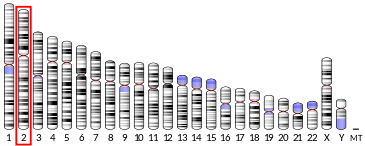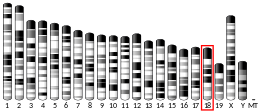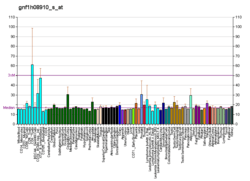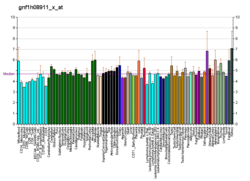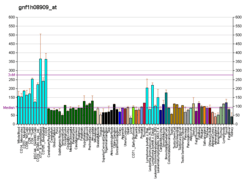IWS1
Protein IWS1 homolog also known as interacts with Spt6 (IWS1) is a protein that in humans is encoded by the IWS1 gene.[5]
IWS1 an transcription elongation factor. It was first identified during a search for RNA polymerase II-associated elongation factors in yeast; it directly interacts with RNA polymerase II (RNAPII) and is phosphorylated at casein kinase II (CKII) sites.[6] The human homolog, which physically interacts with protein arginine methyltransferase 5 (PRMT5), is essential for cell survival.[7] It also recruits a SET2 histone methyltransferase (Huntingtin-interacting protein HYPB, also known as SETD2) to RNAPII during transcription elongation and is required for H3K36 trimethylation.[8]
References
- 1 2 3 GRCh38: Ensembl release 89: ENSG00000163166 - Ensembl, May 2017
- 1 2 3 GRCm38: Ensembl release 89: ENSMUSG00000024384 - Ensembl, May 2017
- ↑ "Human PubMed Reference:".
- ↑ "Mouse PubMed Reference:".
- ↑ "Entrez Gene: IWS1 IWS1 homolog (S. cerevisiae)".
- ↑ Krogan NJ, Kim M, Ahn SH, Zhong G, Kobor MS, Cagney G, Emili A, Shilatifard A, Buratowski S, Greenblatt JF (Oct 2002). "RNA polymerase II elongation factors of Saccharomyces cerevisiae: a targeted proteomics approach". Molecular and Cellular Biology. 22 (20): 6979–92. doi:10.1128/MCB.22.20.6979-6992.2002. PMC 139818. PMID 12242279.
- ↑ Liu Z, Zhou Z, Chen G, Bao S (Feb 2007). "A putative transcriptional elongation factor hIws1 is essential for mammalian cell proliferation". Biochemical and Biophysical Research Communications. 353 (1): 47–53. doi:10.1016/j.bbrc.2006.11.133. PMID 17184735.
- ↑ Yoh SM, Lucas JS, Jones KA (Dec 2008). "The Iws1:Spt6:CTD complex controls cotranscriptional mRNA biosynthesis and HYPB/Setd2-mediated histone H3K36 methylation". Genes & Development. 22 (24): 3422–34. doi:10.1101/gad.1720008. PMC 2607075. PMID 19141475.
Further reading
- Beausoleil SA, Jedrychowski M, Schwartz D, Elias JE, Villén J, Li J, Cohn MA, Cantley LC, Gygi SP (Aug 2004). "Large-scale characterization of HeLa cell nuclear phosphoproteins". Proceedings of the National Academy of Sciences of the United States of America. 101 (33): 12130–5. doi:10.1073/pnas.0404720101. PMC 514446. PMID 15302935.
- Nousiainen M, Silljé HH, Sauer G, Nigg EA, Körner R (Apr 2006). "Phosphoproteome analysis of the human mitotic spindle". Proceedings of the National Academy of Sciences of the United States of America. 103 (14): 5391–6. doi:10.1073/pnas.0507066103. PMC 1459365. PMID 16565220.
- Ling Y, Smith AJ, Morgan GT (2006). "A sequence motif conserved in diverse nuclear proteins identifies a protein interaction domain utilised for nuclear targeting by human TFIIS". Nucleic Acids Research. 34 (8): 2219–29. doi:10.1093/nar/gkl239. PMC 1450333. PMID 16648364.
- Beausoleil SA, Villén J, Gerber SA, Rush J, Gygi SP (Oct 2006). "A probability-based approach for high-throughput protein phosphorylation analysis and site localization". Nature Biotechnology. 24 (10): 1285–92. doi:10.1038/nbt1240. PMID 16964243.
- Olsen JV, Blagoev B, Gnad F, Macek B, Kumar C, Mortensen P, Mann M (Nov 2006). "Global, in vivo, and site-specific phosphorylation dynamics in signaling networks". Cell. 127 (3): 635–48. doi:10.1016/j.cell.2006.09.026. PMID 17081983.
- Liu Z, Zhou Z, Chen G, Bao S (Feb 2007). "A putative transcriptional elongation factor hIws1 is essential for mammalian cell proliferation". Biochemical and Biophysical Research Communications. 353 (1): 47–53. doi:10.1016/j.bbrc.2006.11.133. PMID 17184735.
- Yoh SM, Cho H, Pickle L, Evans RM, Jones KA (Jan 2007). "The Spt6 SH2 domain binds Ser2-P RNAPII to direct Iws1-dependent mRNA splicing and export". Genes & Development. 21 (2): 160–74. doi:10.1101/gad.1503107. PMC 1770899. PMID 17234882.
This article is issued from
Wikipedia.
The text is licensed under Creative Commons - Attribution - Sharealike.
Additional terms may apply for the media files.
